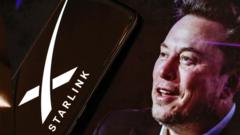The conflict between Elon Musk, the head of Starlink, and the South African government has intensified, highlighted by Musk’s recent social media statements that allege racial discrimination as the reason Starlink cannot operate in the country. Musk, who has a significant online following, contends that the enforcement of black empowerment laws is keeping his satellite internet service from launching in South Africa. However, the Independent Communications Authority of South Africa (Icasa) clarified that Starlink has yet to submit a licensing application, which includes ownership requirements that must align with local laws.
To operate legally, Starlink must secure network and service licenses that mandate at least 30% of ownership be held by entities historically disadvantaged during the apartheid regime. This policy, initiated by the African National Congress (ANC) post-1994, aims to rectify past racial injustices and open economic opportunities for the country’s black majority. Musk, who was born in South Africa, suggests these laws hinder foreign entities from entering the market, contradicting the Foreign Ministry's assertion that numerous U.S. companies are thriving under existing regulations.
Meanwhile, South Africa's Communications Minister Solly Malatsi has shown some alignment with Musk's views, expressing intentions to seek clarity on equity requirements, which could potentially allow Starlink to operate without a local black partner, provided it invests in social programs to benefit disadvantaged communities. Despite initial suggestions for reform, progress has stalled six months later, facing opposition from ANC members who emphasize the importance of adherence to transformation mandates in the tech industry.
The situation is exacerbated by deteriorating relations between the U.S. and South Africa, intensified by former President Trump's comments on land reforms and racial policies in South Africa which Musk has echoed. Tensions hit a peak after Trump criticized racial equity laws and threatened to boycott the upcoming G20 summit in South Africa, raising alarm over false claims of white genocide. This has shifted Musk’s image from a proponent of South African investment to one antagonizing the government, despite prior positive exchanges with President Cyril Ramaphosa.
On another front, Starlink has successfully navigated licensing in other African nations, such as Lesotho, amid concerns over potential political pressures linked to U.S. tariffs, which have fueled allegations of favoring international corporate interests over local development.
Starlink's absence in South Africa leaves an unfulfilled market opportunity, impacting access to internet services for many, particularly rural communities. As the South African government strives for comprehensive internet access by 2030, the possibility of a compromise seems increasingly necessary. Meanwhile, the appointment of Mcebisi Jonas as South Africa's special envoy to the U.S. signals an attempt to mend ties with the American administration, illustrating the ongoing complexities of international business relations tied to domestic policies.



















